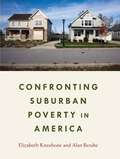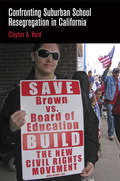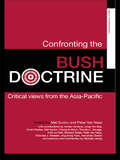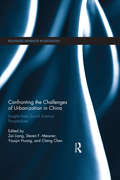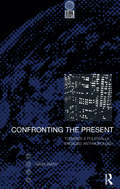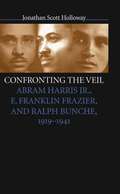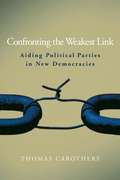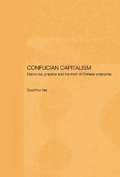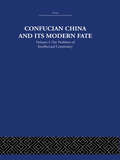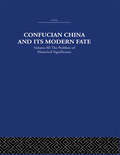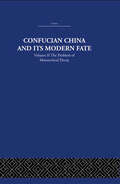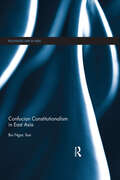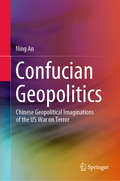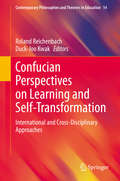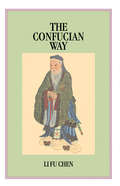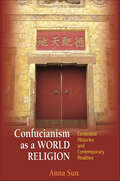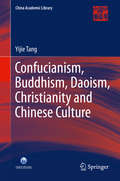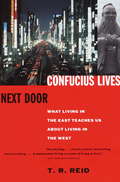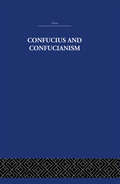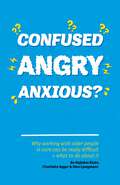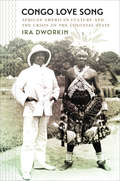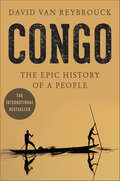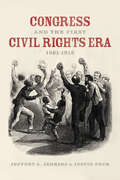- Table View
- List View
Confronting Suburban Poverty in America
by Elizabeth Kneebone Alan BerubeIt has been nearly a half century since President Lyndon Johnson declared war on poverty. Back in the 1960s tackling poverty "in place" meant focusing resources in the inner city and in rural areas. The suburbs were seen as home to middle- and upper-class families--affluent commuters and homeowners looking for good schools and safe communities in which to raise their kids. But today's America is a very different place. Poverty is no longer just an urban or rural problem, but increasingly a suburban one as well. In Confronting Suburban Poverty in America, Elizabeth Kneebone and Alan Berube take on the new reality of metropolitan poverty and opportunity in America.After decades in which suburbs added poor residents at a faster pace than cities, the 2000s marked a tipping point. Suburbia is now home to the largest and fastest-growing poor population in the country and more than half of the metropolitan poor. However, the antipoverty infrastructure built over the past several decades does not fit this rapidly changing geography. As Kneebone and Berube cogently demonstrate, the solution no longer fits the problem.The spread of suburban poverty has many causes, including shifts in affordable housing and jobs, population dynamics, immigration, and a struggling economy. The phenomenon raises several daunting challenges, such as the need for more (and better) transportation options, services, and financial resources. But necessity also produces opportunity--in this case, the opportunity to rethink and modernize services, structures, and procedures so that they work in more scaled, cross-cutting, and resource-efficient ways to address widespread need. This book embraces that opportunity.Kneebone and Berube paint a new picture of poverty in America as well as the best ways to combat it. Confronting Suburban Poverty in America offers a series of workable recommendations for public, private, and nonprofit leaders seeking to modernize poverty alleviation and community development strategies and connect residents with economic opportunity. The authors highlight efforts in metro areas where local leaders are learning how to do more with less and adjusting their approaches to address the metropolitan scale of poverty--for example, integrating services and service delivery, collaborating across sectors and jurisdictions, and using data-driven and flexible funding strategies."We believe the goal of public policy must be to provide all families with access to communities, whether in cities or suburbs, that offer a high quality of life and solid platform for upward mobility over time. Understanding the new reality of poverty in metropolitan America is a critical step toward realizing that goal."--from Chapter One
Confronting Suburban School Resegregation in California
by Clayton A. HurdThe school-aged population of the United States has become more racially and ethnically diverse in recent decades, but its public schools have become significantly less integrated. In California, nearly half of the state's Latino youth attend intensely-segregated minority schools. Apart from shifts in law and educational policy at the federal level, this gradual resegregation is propelled in part by grassroots efforts led predominantly by white, middle-class residential communities that campaign to reorganize districts and establish ethnically separate neighborhood schools. Despite protests that such campaigns are not racially, culturally, or socioeconomically motivated, the outcomes of these efforts are often the increased isolation of Latino students in high-poverty schools with fewer resources, less experienced teachers, and fewer social networks that cross lines of racial, class, and ethnic difference. Confronting Suburban School Resegregation in California investigates the struggles in a central California school district, where a predominantly white residential community recently undertook a decade-long campaign to "secede" from an increasingly Latino-attended school district. Drawing on years of ethnographic research, Clayton A. Hurd explores the core issues at stake in resegregation campaigns as well as the resistance against them mobilized by the working-class Latino community. From the emotionally charged narratives of local students, parents, teachers, school administrators, and community activists emerges a compelling portrait of competing visions for equitable and quality education, shared control, and social and racial justice.
Confronting the Blue Revolution
by Saidul IslamLike the Green Revolution of the 1960s, a "Blue Revolution" has taken place in global aquaculture. Geared towards quenching the appetite of privileged consumers in the global North, it has come at a high price for the South: ecological devastation, displacement of rural subsistence farmers, and labour exploitation. The uncomfortable truth is that food security for affluent consumers depends on a foundation of social and ecological devastation in the producing countries.In Confronting the Blue Revolution, Md Saidul Islam uses the shrimp farming industry in Bangladesh and across the global South to show the social and environmental impact of industrialized aquaculture. The book pushes us to reconsider our attitudes to consumption patterns in the developed world, neoliberal environmental governance, and the question of sustainability.
Confronting the Bush Doctrine: Critical Views from the Asia-Pacific (Asia's Transformations)
by Mel Gurtov Peter Van NessThere is no doubt that President George W. Bush and his administration have transformed US foreign policy and reshaped global international relations in a very profound way. Many American commentators continue to talk about 9/11 as the day the world changed, but increasingly analysts around the world are concluding that more important than 9/11 have been the ideas that the Bush leadership brought into office in January 2001. Confronting the Bush Doctrine is the first book to take on the vitally important task of analyzing how the Asia Pacific region sees and evaluates what the United States is doing. With contributions from an outstanding group of scholars, many of whom are based in the region, this book will prove to be an invaluable resource to all students and scholars of American and Asian politics.
Confronting the Challenges of Urbanization in China: Insights from Social Science Perspectives (Routledge Advances in Sociology)
by Cheng Chen Steven F. Messner Zai Liang Youqin HuangSince the late 1970s, China has experienced an unprecedented pace of urbanization. In 1978, only 17.8% of the population resided in urban areas, but by 2013 the level of urbanization had reached 53.8%. During the same period, China also enjoyed spectacular economic growth. China had become the second largest economy in the world by 2012, just behind the United States. Despite China’s highly acclaimed achievements in urbanization and its economic miracle, urban China confronts a set of significant challenges. This book provides theoretically informed and empirically rich analyses of some of the key challenges facing China’s urbanization. The first part deals with new patterns of urbanization, focusing on comprehensive measures and environmental dimensions of urbanization. The second part of the book focuses on several aspects related to migrants in cities: migrant entrepreneurship, return migration, and local people’s attitudes toward migrants. The final section examines two key issues important for migrants, urban local residents, and policy-makers that have become quite contentious in China today: housing and urban health care. This collection presents original, cutting-edge research on some of the most pressing challenges confronting contemporary urban China, conducted by researchers from multiple social science disciplines. It will appeal to scholars and advanced students of urban studies and China studies, as well as those in sociology, anthropology, geography, and political science.
Confronting the Challenges of Urbanization in China: Insights from Social Science Perspectives (Routledge Advances in Sociology)
by Cheng Chen Steven F. Messner Zai Liang Youqin HuangSince the late 1970s, China has experienced an unprecedented pace of urbanization. In 1978, only 17.8% of the population resided in urban areas, but by 2013 the level of urbanization had reached 53.8%. During the same period, China also enjoyed spectacular economic growth. China had become the second largest economy in the world by 2012, just behind the United States. Despite China’s highly acclaimed achievements in urbanization and its economic miracle, urban China confronts a set of significant challenges.This book provides theoretically informed and empirically rich analyses of some of the key challenges facing China’s urbanization. The first part deals with new patterns of urbanization, focusing on comprehensive measures and environmental dimensions of urbanization. The second part of the book focuses on several aspects related to migrants in cities: migrant entrepreneurship, return migration, and local people’s attitudes toward migrants. The final section examines two key issues important for migrants, urban local residents, and policy-makers that have become quite contentious in China today: housing and urban health care.This collection presents original, cutting-edge research on some of the most pressing challenges confronting contemporary urban China, conducted by researchers from multiple social science disciplines. It will appeal to scholars and advanced students of urban studies and China studies, as well as those in sociology, anthropology, geography, and political science.
Confronting the Present: Towards a Politically Engaged Anthropology (Global Issues #2)
by Gavin SmithAnthropologists study other people and worry about it. In the past this took the form of a professional desire to make our politics always somewhere else and to do with persons characterized as in some way different from ourselves. Now distances shrink and old forms of difference melt as global forces give rise to new processes of differentiation and new possibilities for political collectivities. How does this affect the way we might design a politically relevant anthropology? This book examines these concerns in light of the author's shift from the study of rather distant people to people and places closer to home - a trend to be found within the discipline as a whole. How should anthropology respond to this change, as it increasingly finds itself in stamping grounds where other disciplines are already well-entrenched? How will work being done in anthropology intersect with that in other disciplines? Will anthropologists have anything to offer debates that have been ongoing in these other disciplines, such as those relating to social citizenship and collective identity, regionalism and the constitution of space and place, hegemony and resistance, political organization and cultural expression? Conversely, what can anthropologists learn from the way other disciplines formulate these issues and problems?Written to provoke discussion, this timely book aims to initiate a dialogue not only with anthropologists, but also with those in related disciplines who share a concern with people, politics and modernity. As well as anthropologists, the issues it tackles will be of interest to geographers, economists, political scientists, social historians and sociologists.
Confronting the Veil
by Jonathan Scott HollowayIn this book, Jonathan Holloway explores the early lives and careers of economist Abram Harris Jr., sociologist E. Franklin Frazier, and political scientist Ralph Bunche--three black scholars who taught at Howard University during the New Deal and, together, formed the leading edge of American social science radicalism. Harris, Frazier, and Bunche represented the vanguard of the young black radical intellectual-activists who dared to criticize the NAACP for its cautious civil rights agenda and saw in the turmoil of the Great Depression an opportunity to advocate class-based solutions to what were commonly considered racial problems. Despite the broader approach they called for, both their advocates and their detractors had difficulty seeing them as anything but "black intellectuals" speaking on "black issues." A social and intellectual history of the trio, of Howard University, and of black Washington, Confronting the Veil investigates the effects of racialized thinking on Harris, Frazier, Bunche, and others who wanted to think "beyond race--who envisioned a workers' movement that would eliminate racial divisiveness and who used social science to demonstrate the ways in which race is constructed by social phenomena. Ultimately, the book sheds new light on how people have used race to constrain the possibilities of radical politics and social science thinking.
Confronting the Weakest Link
by Thomas CarothersBeset with persistent problems of self-interest, corruption, ideological incoherence, and narrow electoral majorities, political parties are the weakest link in many democratic transitions around the world. A large and ever-growing number of U.S., European, and multilateral assistance programs seek to help parties become effective pro-democratic actors. But given the depth of the problems, is success possible? C onfronting the Weakest Link is a pathbreaking study of international aid for political parties. Beginning with a penetrating analysis of party shortcomings in developing and postcommunist countries, Thomas Carothers draws on extensive field research to diagnose chronic deficiencies in party aid, assess its overall impact, and offer practical ideas for doing better. This critical analysis spans Latin America, Central and Eastern Europe, the former Soviet Union, Africa, the Middle East, and Asia. It sheds invaluable light on a major element of the contemporary challenge of democracy building, a subject now occupying center stage in the international policy arena.
Confucian Capitalism: Discourse, Practice and the Myth of Chinese Enterprise (Chinese Worlds)
by Souchou YaoThe discourse of Confucian Capitalism has been crucial in shaping our understanding of the brilliant economic successes of the Chinese diaspora all over the world. From this perspective, hard work, family values, and communal cohesion, as well as business practices based on sentiment, trust, and social networks, are the legendary means of explaining the wealth and commercial talent of these remarkable people. The book examines the subject of Chinese business' by exposing the enduring myth about the determining effects of these values and practices supposedly derived from Confucianism. Such myth relies on an ahistorical and essentialised notion of Chinese Culture', and brings into focus three sites of controversy: the economically driven Chinese subject, work-place relations characterised by consensus and cultural sharing, and an operating ethos of collectivist, pre-capitalist sociality. In its interrogation of the discourse of Confucian capitalism, it is the aim of this book to arrive at a critically informed and socially realistic understanding of Chinese business. The author combines abstract analysis with examples from anthropological fieldwork among Chinese traders in Sarawak, East Malaysia. By anchoring theoretical discussion to real case-studies, the multi-disciplinary approach of this book offers a useful insight into Chinese business activities, and contributes to current debates in cultural studies, economic anthropology, the economic performance of overseas Chinese, and neo-Confucian societies more generally.
Confucian China and its Modern Fate: Volume One: The Problem of Intellectual Continuity
by Joseph R. LevensonFirst published in 1958These volumes analyze modern Chinese history and its inner process, from the pre-western plateau of Confucianism to the communist triumph, in the context of many themes: science, art, philosophy, religion and economic, political, and social change. Volume One includes: · The critique of Idealism· Science and Ch'ing empiricism· The Ming style, in society and art· Confucianism and the end of the Taoist connection· Eclecticism in the area of native Chinese choices· T'i and Yung · The Chin-Wen School and the classical sanction· The modern Ku-Wen opposition to Chin-Wen reformism· The role of nationalism· Communism· Western powers and Chinese revolutions· Language change and the problem of continuity
Confucian China and its Modern Fate: Volume Three: The Problem of Historical Significance
by Joseph R. LevensonFirst published in 1965.These volumes analyze modern Chinese history and its inner process, from the pre-western plateau of Confucianism to the communist triumph, in the context of many themes: science, art, philosophy, religion and economic, political, and social change. Volume Three includes: · Liao P'ing and the Confucian Departure from History · The place of Confucius in Communist China · Historical, moral and intellectual significance
Confucian China and its Modern Fate: Volume Two: The Problem of Monarchical Decay
by Joseph R. LevensonFirst published in 1964These volumes analyze modern Chinese history and its inner process, from the pre-western plateau of Confucianism to the communist triumph, in the context of many themes: science, art, philosophy, religion and economic, political, and social change. Volume Two includes: · The Republic: Confucianism and Monarchism interwoven· Confucianism and Monarchy: The basic confrontation · The evolution of the Confucian Bureaucratic personality· The limits of despotic control · Monarch and people · The Taiping Relation to Confucianism· The Japanese and Chinese monarchical mystiques
Confucian Constitutionalism in East Asia (Routledge Law in Asia)
by Bui Ngoc SonWestern liberal constitutionalism has expanded recently, with, in East Asia, the constitutional systems of Japan, South Korea and Taiwan based on Western principles, and with even the socialist polities of China and Vietnam having some regard to such principles. Despite the alleged universal applicability of Western constitutionalism, however, the success of any constitutional system depends in part on the cultural values, customs and traditions of the country into which the constitutional system is planted. This book explains how the values, customs and traditions of East Asian countries are Confucian, and discusses how this is relevant to constitutional practice in the region. The book outlines how constitutionalism has developed in East Asia over a long period, considers different scholarly work on the ease or difficulty of integrating Western constitutionalism into countries with a Confucian outlook, and examines the prospects for such integration going forward. Throughout, the book covers detailed aspects of Confucianism and the workings of constitutions in practice.
Confucian Geopolitics: Chinese Geopolitical Imaginations of the US War on Terror
by Ning AnThis book presents an essential non-western geopolitical landscape and draws on the conceptual framework of critical geopolitics to discuss the views on terrorism held by various groups of Chinese people, including the elite, middle class, and masses. After investigating these views, the book posits that these Chinese geopolitical imaginaries cannot be fully understood using the extant geopolitical theories, including communism, nationalism, and realism. Accordingly, it subsequently seeks to adapt the Confucian geopolitical idea in order to theorize Chinese geopolitics. By doing so, the book reintroduces the historically embedded but long-ignored traditional Chinese political geography philosophies (in particular Confucian thinking) into efforts to explain Chinese geopolitics. In this regard, it promotes a specific and importantly Confucianism-based understanding of international security politics. The geopolitical model provided can also help to explain Chinese views on other major geopolitical issues.
Confucian Perspectives on Learning and Self-Transformation: International and Cross-Disciplinary Approaches (Contemporary Philosophies and Theories in Education #14)
by Duck-Joo Kwak Roland ReichenbachThis book bridges the regions of East Asia and the West by offering a detailed and critical inquiry of educational concepts of the East Asian tradition. It provides educational thinkers and practitioners with alternative resources and perspectives for their educational thinking, to enrich their educational languages and to promote the recognition of educational thoughts from different cultures and traditions across a global world.The key notions of Confucian and Neo-Confucian philosophy directly concern the ideals, processes and challenges of learning, education and self-transformation, which can be seen as the western equivalences of liberal education, including the German concept of Bildung. All the topics in the book are of fundamental interest across diverse cultures, giving a voice to a set of long-lasting and yet differentiated cultural traditions of learning and education, and thereby creating a common space for critical philosophical reflection of one's own educational tradition and practice. The book is especially timely, given that the vocabularies in educational discourse today have been dominantly “West centred” for a long time, even while the whole world has become more and more diverse across races, religions and cultures. It offers a great opportunity to philosophers of education for their cross-cultural understanding and self-understanding of educational ideas and practices on both personal and institutional levels.
Confucian Way: A New And Systematic Study Of The Four Books
by ChenFirst published in 1987. Routledge is an imprint of Taylor & Francis, an informa company.
Confucianism as a World Religion: Contested Histories and Contemporary Realities
by Anna SunIs Confucianism a religion? If so, why do most Chinese think it isn't? From ancient Confucian temples, to nineteenth-century archives, to the testimony of people interviewed by the author throughout China over a period of more than a decade, this book traces the birth and growth of the idea of Confucianism as a world religion. The book begins at Oxford, in the late nineteenth century, when Friedrich Max Müller and James Legge classified Confucianism as a world religion in the new discourse of "world religions" and the emerging discipline of comparative religion. Anna Sun shows how that decisive moment continues to influence the understanding of Confucianism in the contemporary world, not only in the West but also in China, where the politics of Confucianism has become important to the present regime in a time of transition. Contested histories of Confucianism are vital signs of social and political change. Sun also examines the revival of Confucianism in contemporary China and the social significance of the ritual practice of Confucian temples. While the Chinese government turns to Confucianism to justify its political agenda, Confucian activists have started a movement to turn Confucianism into a religion. Confucianism as a world religion might have begun as a scholarly construction, but are we witnessing its transformation into a social and political reality? With historical analysis, extensive research, and thoughtful reflection, Confucianism as a World Religion will engage all those interested in religion and global politics at the beginning of the Chinese century.
Confucianism, Buddhism, Daoism, Christianity and Chinese Culture (China Academic Library)
by Yijie TangThis book collects the 25 most important articles written by Professor Tang since the 1980s, dealing extensively with issues of Confucianism, Buddhism, Daoism, Christianity and Chinese culture. In these articles, Professor Tang proves his value as a worthy successor to the Chinese philosophical tradition, while also open to the latest trends of thought both at home and abroad. The late Professor Tang Yijie (1927-2014) was a prominent professor at Peking University and China's top scholar on philosophy and Chinese studies. He spearheaded the Confucian Canon project (**), which seeks to compile all known classical works on Confucianism, comparable in scope and significance to the Complete Library of the Four Treasuries (****), the largest collection of books on Chinese history, which was commissioned by the Qianlong Emperor in the 18th century. Throughout his life, Professor Tang published scores of books and more than one hundred articles, offering enlightening insights into how to deal with issues that have historically troubled and continue to trouble people in modern society. Among his numerous innovations, Professor Tang is especially remembered for introducing the concept of "harmony in diversity"****. In the context of "the clash of civilizations" championed by Samuel P. Huntington, Tang argued for harmony in diversity, holding that this principle can offer some clues to help enable peoples, nations, and regions with different cultural traditions to develop together while remaining unique. note: * represents Chinese character, please refer to BCC file.
Confucius Lives Next Door: What Living in the East Teaches Us About Living in the West
by T. R. ReidThose who've heard T. R. Reid's weekly commentary on National Public Radio or read his far-flung reporting in National Geographic or The Washington Post know him to be trenchant, funny, and cutting-edge, but also erudite and deeply grounded in whatever subject he's discussing. In Confucius Lives Next Door he brings all these attributes to the fore as he examines why Japan, China, Taiwan, and other East Asian countries enjoy the low crime rates, stable families, excellent education, and civil harmony that remain so elusive in the West. Reid, who has spent twenty-five years studying Asia and was for five years The Washington Post's Tokyo bureau chief, uses his family's experience overseas--including mishaps and misapprehensions--to look at Asia's "social miracle" and its origin in the ethical values outlined by the Chinese sage Confucius 2,500 years ago. When Reid, his wife, and their three children moved from America to Japan, the family quickly became accustomed to the surface differences between the two countries. In Japan, streets don't have names, pizza comes with seaweed sprinkled on top, and businesswomen in designer suits and Ferragamo shoes go home to small concrete houses whose washing machines are outdoors because there's no room inside. But over time Reid came to appreciate the deep cultural differences, helped largely by his courtly white-haired neighbor Mr. Matsuda, who personified ancient Confucian values that are still dominant in Japan. Respect, responsibility, hard work--these and other principles are evident in Reid's witty, perfectly captured portraits, from that of the school his young daughters attend, in which the students maintain order and scrub the floors, to his depiction of the corporate ceremony that welcomes new employees and reinforces group unity. And Reid also examines the drawbacks of living in such a society, such as the ostracism of those who don't fit in and the acceptance of routine political bribery. Much Western ink has been spilled trying to figure out the East, but few journalists approach the subject with T. R. Reid's familiarity and insight. Not until we understand the differences between Eastern and Western perceptions of what constitutes success and personal happiness will we be able to engage successfully, politically and economically, with those whose moral center is governed by Confucian doctrine. Fascinating and immensely readable, Confucius Lives Next Door prods us to think about what lessons we might profitably take from the "Asian Way"--and what parts of it we want to avoid.
Confucius and Confucianism
by Richard WilhelmFirst published in 1931. This re-issues the edition of 1972. This translation and Wilhelm's invaluable commentaries provide a concise and readable survey of Confucius, the man and his teachings. This volume translates The Life of Confucius from an ancient Chinese text, the Shih Chi, or The Historical Records by Sse-Ma Ch'ien, dating from the turn of the second century B.C.
Confused, Angry, Anxious?: Why working with older people in care really can be difficult, and what to do about it
by Bo Hejlskov Elvén Charlotte Agger Iben LjungmannWorking with older people in care can be challenging and frustrating, especially when they behave in ways that seem irrational, aggressive, or unreasonably repetitive, and nothing you can do seems to help. The authors of this useful and practical book explain how to understand the difficult and annoying ways in which older people in care can behave, (especially people with dementia), how to stay calm and kind, and how to solve the problems they can create. With many examples of everyday challenges and how to deal with them, this book has the potential to change your working life.
Congo Love Song: African American Culture and the Crisis of the Colonial State (The John Hope Franklin Series in African American History and Culture)
by Ira DworkinIn his 1903 hit "Congo Love Song," James Weldon Johnson recounts a sweet if seemingly generic romance between two young Africans. While the song's title may appear consistent with that narrative, it also invokes the site of King Leopold II of Belgium's brutal colonial regime at a time when African Americans were playing a central role in a growing Congo reform movement. In an era when popular vaudeville music frequently trafficked in racist language and imagery, "Congo Love Song" emerges as one example of the many ways that African American activists, intellectuals, and artists called attention to colonialism in Africa.In this book, Ira Dworkin examines black Americans' long cultural and political engagement with the Congo and its people. Through studies of George Washington Williams, Booker T. Washington, Pauline Hopkins, Langston Hughes, Malcolm X, and other figures, he brings to light a long-standing relationship that challenges familiar presumptions about African American commitments to Africa. Dworkin offers compelling new ways to understand how African American involvement in the Congo has helped shape anticolonialism, black aesthetics, and modern black nationalism.
Congo: The Epic History of a People
by David Van Reybrouck“A magnificent, epic look at the history of the region. . . . A monumental contribution to the annals of Congo scholarship” (Christian Science Monitor).The International BestsellerFrom the beginnings of the slave trade through colonization, the struggle for independence, Mobutu's brutal three decades of rule, and the civil war that has raged from 1996 to the present day, Congo: The Epic History of a People traces the history of one of the most devastated nations in the world. Esteemed scholar David Van Reybrouck balances hundreds of interviews with a diverse range of Congolese with meticulous historical research to construct a multidimensional portrait of a nation and its people.Epic in scope yet eminently readable, both penetrating and deeply moving, Congo—a finalist for the Cundill Prize—takes a deeply humane approach to political history, focusing squarely on the Congolese perspective, and returns a nation’s history to its people.“A compelling mixture of literary and oral history that delivers an authentic story of how European colonialism, African resistance, and the endless exploitation of natural resources affected the lives of the Congolese.” —Booklist“A vivid panorama of one of the most tormented lands in the world.” —Washington Post
Congress and the First Civil Rights Era, 1861-1918
by Jeffery A. Jenkins Justin PeckCivil rights legislation figured prominently in the agenda of Congress during the Civil War and Reconstruction. But as Reconstruction came to an end and discrimination against African Americans in the South became commonplace, civil rights advocates in Congress increasingly shifted to policies desired by white constituents in the North who had grown tired of efforts to legislate equality. In this book, the first of a two-volume set, Jeffery A. Jenkins and Justin Peck explore the rise and fall of civil rights legislation in Congress from 1861 to 1918. The authors examine in detail how the Republican Party slowly withdrew its support for a meaningful civil rights agenda, as well as how Democrats and Republicans worked together to keep civil rights off the legislative agenda at various points. In doing so, Jenkins and Peck show how legal institutions can be used both to liberate and protect oppressed minorities and to assert the power of the white majority against those same minority groups.
